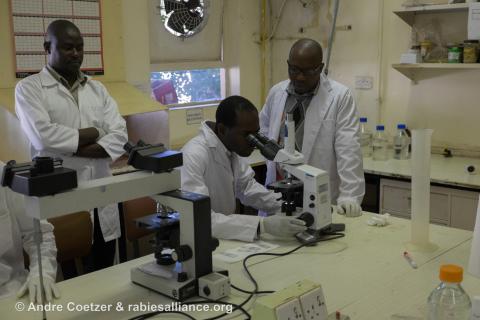Why do countries need capacity building support?
Capacity building is an essential component of the work of many international organisations and NGOs, including GARC. In the case of governments, this might seem unnecessary – technical expertise exists within many countries, and the assumption is that governments are able to access funds to train their people or send them to other countries to learn new skills and knowledge. Unfortunately, in the case of rabies control, this has not usually led to concrete and sustained action in building local expertise on diagnostics, surveillance, vaccinating animals, and raising community awareness.
One reason for this lack of action is the low priority of rabies prevention among the many public health concerns of national governments, leading to a lack of resources allocated to tackle this disease. Bringing in external capacity building support therefore serves a number of functions. The most obvious role is a direct increase of skills and resources within the country, ideally with people who are in a position to use those skills effectively to take rabies elimination forward.
The second function, related to the first, is the ability of these trained individuals to train others across the country, resulting in a much greater capacity within the country to deal with rabies. An additional benefit is that the increased skills can result in a greater commitment to rabies elimination, building a strong group of local advocates within the country.
Providing external capacity building support demonstrates to governments that international stakeholders are committed to helping countries develop their own sustainable resources and abilities to meet the global goal of eliminating rabies death by 2030.
And finally, it demonstrates practical ways forward, sending a message to countries that rabies is a problem that can be solved.
At GARC’s Pan-African Rabies Control Network regional meetings, animal and human health sector representatives from African countries learn how to use tools that will facilitate their rabies control efforts, including the Stepwise Approach towards Rabies Elimination, the Rabies Blueprint, the GARC Education Platform and the Rabies Epidemiological Bulletin.
These have been followed and complemented by more in-depth in-country planning and training workshops focused on the development of national plans, training in diagnostics, surveillance and vaccinating animals, support to set up surveillance programmes or pilot vaccination campaigns. Collaboration with local partners to provide field training generates a model programme that can be expanded to other areas. Similar regional capacity building networks are being strengthened in the Middle East and Eastern Europe and will be established for Asian countries this year.
For elimination efforts to succeed, rabies needs to be made a priority disease by every government in an endemic country, with national control plans created and implemented.. Capacity building support can kick-start this process and facilitate activities that demonstrate its feasibility.
Contributed by Deepashree Balaram, GARC
